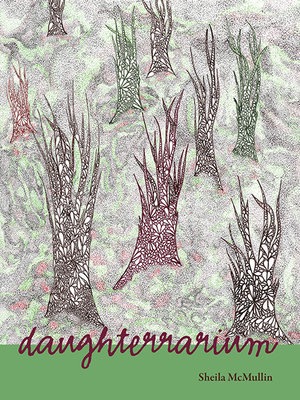Exploring the intersection of shame and anger, my work is a fantasy autobiographic. Emerging as lived experience and reenactment daydreams, my poems reflect hostile aggression
against an embodied woman, spectral tendencies to dissociate, maneuver into escapist fantasies, or reproach with candor. It is a trial in empathy. The whole of the manuscript, daughterrarium, explores relationships which are not chosen, which are often mitigated, and exploited as a backdrop to sexual fantasy or maidship. Despite, what emerges by the end of the collection is something with such strength.
What People Are Saying about daughterrarium
“There are those who have hurt you not because you are ignorant, but because you have a heart.” Sheila McMullin’s daughterrarium is a collection of the kindest rage I have ever seen. The book chronicles, among its tendernesses, McMullin’s refusal to turn the rage onto herself–“How not to blame myself for being fragile?”– and the difficulty of locating what is hurting us, or why, and how to heal a wound that is constantly re-opened. If you believe in rage, if you care deeply about women, then read this brilliant book again and again across your lifetime. Otherwise, “You have to get out of the way.”
–Sarah Vap
What are we born into? What does it mean to be loved by God and Earth? What do we owe and to whom? How does one experience the fusion of anger and shame in a mind and body? What do the doctors say to the bodies that are broken? Where do the bodies go when they are taken away from themselves? How does a body heal itself? How does a body degrade itself? How does a body mourn and survive the trauma of fear, pain and abuse? I admire daughterrarium for pushing too far, for making me cringe with its representations of what one human can do to another, of what a body can do to itself. McMullin takes a tenacious look at violence and the abject while also interrogating, with great compassion, the nature of faith, family and growth.
–Daniel Borzutzky
In a dish of fevered poppies, glassy ranunculus, and red tide hunger, the daughter infects herself. She’s infected by self, burning up until McMullin’s cool hand runs across the daughterrarium’s viral waters. Cancer, the crab, a sunrise that won’t clot. The neogothic daughter, her many manifestations bleed together in this prize-winning jailbreak. She says [t]ake me out of this bed and put me back in the grass, but really she’s taking us. Out, back. Give her your hand or get out of her way.
–Danielle Pafunda
Publisher’s Information
- PUBLISHER: Cleveland State University Poetry Center
- ISBN: 978-0-9963167-5-0
- DIMENSIONS: 6.1 x 0.4 x 7.9 inches
- PAGES: 112]
- PRICE: $16.00
- RELEASE DATE: 04/01/2017
- PURCHASE HERE
Recommended Works by Sheila McMullin
Favorite Eckleburg Work: https://eckleburg.org/lessons/week-1-evolving-origins-poetry-workshop-2/
End of the Sentimental Journey by Sarah Vap
Sarah Vap’s End of The Sentimental Journey is a beautiful collection of the most critically astute filth I’ve ever read. With humor, stunning insight, and shimmering vulgarity Vap invents a fresh means of poetic critique in the poem itself. What she unveils for us is our own culpability in the gendered policing of contemporary poetry. I, for one, feel stimulated at being called out. I love this book. –Dawn Lundy Martin READ MORE
Lydia’s Funeral Video by Sam Chanse
Lydia’s Funeral Video is a one-woman play that takes that most existential of quandaries — to be or not to be — and transposes it onto a dystopian not-so-distant future. READ MORE
Discussion Questions for daughterrarium
1. Did it make you think about your ancestors, your present family, your distant family, your plant family? I hope so, and how so?
2. How does this book interrogate the distance between shame and anger, and the somatic and/or thought spirals this can trigger?
3. The book uses several tones throughout — how does the movement through each enhance, compliment, complicate, deflate each other?
About Sheila McMullin
Sheila McMullin is author of daughterrarium (Cleveland State University Poetry Center, 2017). She co-edited the collections Humans of Ballou and The Day Tajon Got Shot from Shout Mouse Press. She volunteers at her local animal rescue, is a youth ally and organizer, and holds an M.F.A. from George Mason University. Find more about her writing, editing, and activism online at www.moonspitpoetry.com.
Exploring the intersection of shame and anger, my work is a fantasy autobiographic. Emerging as lived experience and reenactment daydreams, my poems reflect hostile aggression against an embodied woman, spectral tendencies to dissociate, maneuver into escapist fantasies, or reproach with candor. It is a trial in empathy. The whole of the manuscript, daughterrarium, explores relationships which are not chosen, which are often mitigated, and exploited as a backdrop to sexual fantasy or maidship. Despite, what emerges by the end of the collection is something with such strength.
Do You Have a Book Launching? Submit Your Book to The Eckleburg Book Club…
[leaky_paywall_register_form]







